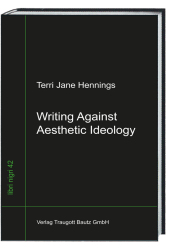 Neuerscheinungen 2016Stand: 2020-02-01 |
Schnellsuche
ISBN/Stichwort/Autor
|
Herderstraße 10
10625 Berlin
Tel.: 030 315 714 16
Fax 030 315 714 14
info@buchspektrum.de |

Terri Jane Hennings, Hans Rainer Sepp
(Beteiligte)
Writing Against Aesthetic Ideology
Herausgegeben von Sepp, Hans Rainer
2016. 171 S. 232 mm
Verlag/Jahr: BAUTZ 2016
ISBN: 3-9594818-1-0 (3959481810)
Neue ISBN: 978-3-9594818-1-6 (9783959481816)
Preis und Lieferzeit: Bitte klicken
This book aims to offer a retrospective "slice" of the debate between modernism and postmodernism that dominated academia in the 1980´s, particularly in the United States. Looking at two works of fiction from two different authors from this period I hope to show how the debate and the influence of postmodernism was not confined to academic ivory towers but rather became "mainstream"; spreading postmodern ideas among the general reading public even if the public was not consciously aware of it. Although postmodernism itself was highly sceptical of narrative linearity, my strategy will be quintessentially narrative: to offer a flashback. What follows reflects the thinking of a certain period in critical and literary theory that raised heretofore unheard of questions: what exactly is a "text" and where are its boundaries? How are these boundaries produced and policed? Who has the authority to decide what is a "proper" literary text? In short, the last 40 years witnessed a radical transformation in the way literary scholars conceive of the terms "text" and "meaning," and not without fierce controversy. By looking back at this raging debate we can better understand where we are today in literary criticism and theory. But before diving into the work a bit of background is in order.
Foreword
Introduction
CHAPTER 1: The Institution of the Aesthetic
"It´s Greek to Me" or The Foundation of European Philosophy
Historical vs. Fictional and the Modern Nation State
Kant and Aesthetics
The Kantian Enterprise
The Beautiful and the Sublime
History versus Language
Kant and the Institutionalization of Art
The Influence of Sign Theory
CHAPTER 2: The Historical Dimension of the Aesthetic
The Beautiful and the Sublime Revisited
Value and Traditional Narrative
The Great Pursuit
The Interpretive Community
CHAPTER 3: The Great Pursuit
Commodification, Derivation, and Desire: Baby Hutchmeyer
CHAPTER 4: City of Glass
Afterword
Bibliography


